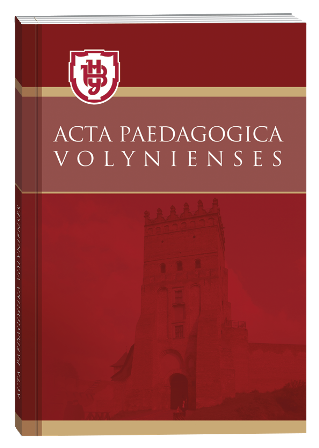THE ORIGIN OF THE ISSUE OF FORMING THE RHETORICAL COMPETENCE IN FUTURE JOURNALISTS AS AN OBJECT OF THEORETICAL ANALYSIS IN PEDAGOGICAL SCIENCE
DOI:
https://doi.org/10.32782/apv/2023.3.7Keywords:
rhetoric, stages of formation of rhetoric, development of public speaking, rhetorical knowledge, skills, rhetorical experience, outstanding rhetoricians, rhetorical competence of future journalists.Abstract
The article describes the origin of the issue of forming the rhetorical competence in future journalists within the framework of pedagogical discourse to determine the degree of scrutiny of the problem under analysis and consideration of the methodological expediency of implementing scholarly achievements over different time intervals in theory and practice of training specialists in various branches of industry. The study of the source base, special literature and theses in today’s educational realities and trends enabled to specify the stages of formation and development of rhetoric as a science, as well as to determine the fundamental changes at the millennium described thoroughly in the works of the scholars studying this problem in a retrospective from the antiquity to the present. This strongly affected the construal of both the content of the concept "rhetorical competence" and the definition of theoretical and methodological foundations for forming the rhetorical competence in specialists in various areas, notably journalism. Consolidation of theoretical developments of philosophers, psychologists, linguists, psycholinguists, teachers and specialists in linguodidactics allows us to ascertain that the scholars interpret the content of the concept of "rhetoric" in different ways depending on the stage of its development. The following definitions are retrieved: the art of controlling the mind; the theory of public speaking; the science of the laws of managing mental and speech activity; the art of persuasion; a tool for educating; the art of words; the art of managing social processes; speech technology; oratorical art; an endowment to seize the mind and heart of the interlocutor; the skill of using speech to transmit information for intellectual and emotional persuasion; a science scrutinizing the laws of making a speech to influence the audience and achieving a certain goal in communication; the doctrine of speech in its broadest meaning, namely about the individual use of language traditions in various circumstances of socio-cultural life. The notion "rhetorical competence of future journalists" is construed as a complex multi-component phenomenon covering mental-and-speech and communicative activity, which allows to produce communicatively expedient utterances in compliance with the norms of the Ukrainian language in an extensive media sphere and in the educational process through the accumulation of the communicative experience, the development of linguistic flair and language stability, assimilation of rhetorical knowledge, formation of skills, abilities and values for flexible construction of one’s own communication strategies relevant to the communicative goals, areas, genres and situations in the journalistic field.
References
Будянський Д. В. Напрямки використання здобутків риторики в процесі розвитку риторичної культури викладача вищого навчального закладу. Науковий вісник Ужгородського університету. Серія «Педагогіка. Соціальна робота». 2017. Вип.1(40). С. 38-41.
Гаркуша І. В. Риторична культура мовлення сучасного фахівця-психолога : навч. посіб. Дніпро : Університет імені Альфреда Нобеля, 2019. 143 с.
Головешко Б. Р. Педагогічні умови формування лідерських якостей у майбутніх фахівців з адміністративного менеджменту у вищому навчальному закладі : дис. ... канд. пед. наук : 13.00.04 / Національний технічний університет «Харківський політехнічний інститут». Харків, 2017. 294 с.
Голуб Н. Б. Роль і місце риторики у системі шкільної мовної освіти. Ювілейний збірник Національної академії педагогічних наук України. 2017. С. 147-151.
Гузар О. Комунікативне лідерство керівників освітніх закладів : навч. посібн. Київ : ДП «НВЦ «Пріоритети», 2016. 40 с.
Каніболоцька Л. В. Педагогічні умови формування риторичної компетентності майбутніх викладачів вищих аграрних навчальних закладів у процесі фахової підготовки. Науковий вісник Національного університету біоресурсів і природокористування України. Серія : Педагогіка, психологія, філософія. 2016. Вип. 239. С. 101-106.
Караман С. О., Караман О. В. Орфоепічний тренінг. Фонетика. Орфоепія. Орфографія. Графіка. Стилістика. Риторика. Завдання і вправи : Навчальний посібник. Вид. 3-тє переробл. і доп. КМПУ ім. Б. Д. Грінченка, 2009. 184 с.
Конівіцька Т. Я. Структура риторичної компетентності психологів. Проблеми освіти : зб. наук. пр. ДНУ «Інститут модернізації змісту освіти». Київ, 2019. Вип. 93. С. 156-168.
Мацько Л.І. Риторика: Навч. Посіб. 2-ге вид. стер. / Л.І.Мацько, О.М.Мацько. К.: Вища школа, 2006. 311 с.
Нищета В. Риторична компетентність учнів загальноосвітніх шкіл як педагогічна проблема / В. Нищета // Вісник Луганського національного університету імені Тараса Шевченка (педагогічні науки): [частина ІІ ]. Листопад, 2010. № 22 (209). С. 93-98.
Педагогічна риторика: історія, теорія, практика : монографія / [О. А. Кучерук, Н. Б. Голуб, О. М. Горошкіна, С. О. Караман та ін.] ; за ред. О. А. Кучерук. Київ : КНТ, 2016. 258 с.
Попович А. С. Методика навчання стилістики майбутніх учителів української мови і літератури в закладах вищої освіти: монографія. Кам’янець-Подільський: ФОП Сисин Я. І., 2018. 376 с.
Сагач Г.М. Риторика: [навч. посібник]; вид. 2-е, перероб. / Г.М.Сагач. К.: Ін Юре, 2000. 568 с.
Сучасна педагогічна риторика: теорія, практика, міжпредметні зв’язки: [зб. наук. праць за матеріалами наук. семінару]; за ред. Т.А.Космеди. Львів: ПАІС, 2007. 267 с.
Ткаченко Л.П. Фахова спрямованість курсу риторики у практиці сучасних закладів вищої освіти. URL: https://dspace.hnpu.edu.ua/bitstreams/16c583e9-2c9b-4b22-86da-e6a07e3160e5/download







